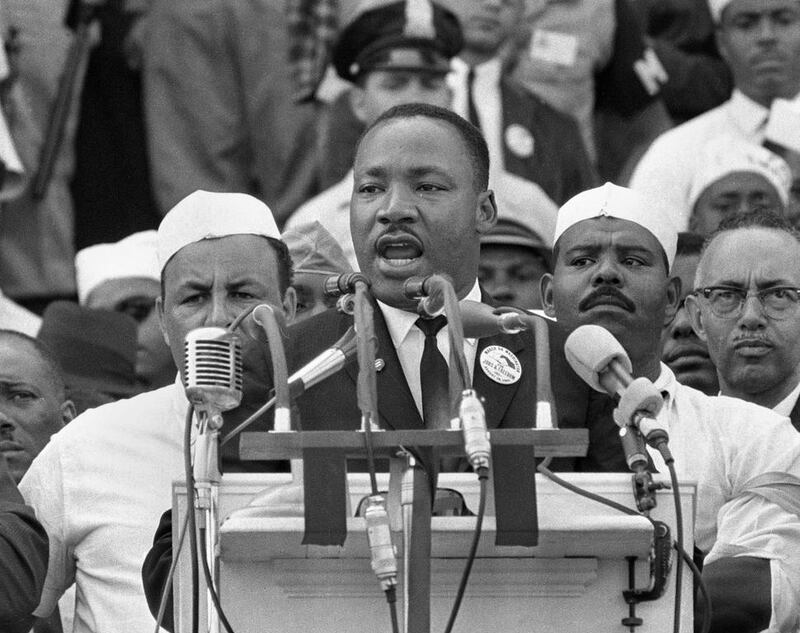The city of Selma, Alabama was at the centre of the civil rights movement in the United States during the 1960s. There is an iconic photograph from that period showing a line of men and women, dressed in crisp suits with leis around their necks and arms locked together walking forward with the grace of conviction. Dr Martin Luther King, Jr is in the centre of the photo surrounded by a sea of black and white faces. To his left are Jewish activists including Rabbi Abraham Joshua Heschel.
Jewish Americans played a small but significant role in the US civil rights movement. Other than Heschel, many remember the ultimate sacrifice of Andrew Goodman and Michael Schwerner or the lyrics of Strange Fruit protesting lynching in the American South written by Abel Meeropol. Goodman and Schwerner were killed by the Ku Klux Klan for taking part in the 1964 Freedom Summer where many Jews helped a massive voter registration effort in the south.
Before the civil rights marches of the 1960s, Jewish labour activists had established strong links with black workers. Israel’s takeover of the West Bank and Gaza in 1967, however, drove a wedge between the mainstream pro-Israel Jewish community in the US and black activists that still exists today.
With the rise of smartphones that allow anyone to broadcast their lives to social media, endemic police violence against black American citizens has brought the civil rights debate back to the forefront of American life. After a white police officer was acquitted of murdering a black teen in Florida in 2013, a movement called Black Lives Matter began with a hashtag on Twitter. It has transformed into one of the most important grass roots social movements in America since the 1960s.
This month, the Movement for Black Lives (MBL), a coalition of more than 50 organisations that includes Black Lives Matter, released a wide-ranging policy platform and manifesto. Their stated goal is to unify black voices to articulate a vision for the future and a way to achieve it.
At nearly 37,000 words, the platform is long and touches on topics ranging from how to end the war on black people to community control and economic justice. When it comes to US foreign policy, the MBL endorses the Boycott, Divestment and Sanctions (BDS) movement against Israel and articulates its reason for supporting the Palestinian people. The platform states: “The US justifies and advances the global war on terror via its alliance with Israel and is complicit in the genocide taking place against the Palestinian people.”
After the MBL released its policy platform, a flood of condemnations from pro-Israel groups followed. Memory of the Holocaust and support for Israel are the central pillars of contemporary American Jewish identity. While using the term “genocide” to describe Israel’s domination of the Palestinians is misplaced, the position that the MBL has taken on Israel and Palestine is a principled and necessary one.
Writing in the Israeli press, a Palestinian writer named Amjad Iraqi summed up the tension over the genocide term.
He wrote: “For all the crimes that Palestinians are subjected to, placing our situation on the same pedestal as history’s most egregious and murderous atrocities gives us an unwarranted exceptionalism which, in my view, undermines the transnational consciousness that we are trying to promote.”
Was it a good idea for MBL to take such a stance on Palestine in its policy vision for the movement despite the distracting debate with pro-Israel groups? The short answer is yes.
For one, the Israel lobby in the United States has gloated for years that it has successfully made support for Tel Aviv into a bi-partisan “domestic” issue. When Israeli prime minister Benjamin Netanyahu went around US president Barack Obama and addressed a joint session of Congress to prevent the Iran nuclear deal, some in the American media joked that Mr Netanyahu was behaving like a Republican senator, not a foreign head of state. The US has also given more money to Israel in aid than any other country in the world ($100 billion since 1962).
Representing American citizens suffering from a lack of community resources and crumbling infrastructure (think about the Flint, Michigan water crisis), the MBL has every right to criticise aid packages to Israel. But there is a bigger issue here that concerns the idea of principled struggle.
The Jewish Americans that risked life and limb to join the 1960s civil rights struggle did so out of a conviction of the universality of human rights and a reading of Jewish history that highlighted the repeated discrimination of Jews. The deprivation of rights of any one group is an act of aggression against all groups.
This position naturally extends to solidarity with the Palestinian people subject to a humiliating military occupation by Israel. By embracing and supporting the boycott campaign, the MBL is honouring the principles of those Jews who joined the civil rights movement decades ago and the many that continue to fight against Israeli domination today. Based on Heschel’s later writings on social justice, there is little doubt that many of the Jewish pioneers of the civil rights movement would encourage the MBL position on BDS.
As Mr Iraqi noted, the Palestinian struggle is a part of a transnational consciousness that includes all who are fighting for their civil rights. The MBL might end up doing the Jewish community in America a favour by reminding them that their support for Israel’s continued occupation and treatment of Palestinians is a slap in the face of those Jews who stood on the front lines in America’s civil rights movement.
jdana@thenational.ae
On Twitter: @ibnezra





